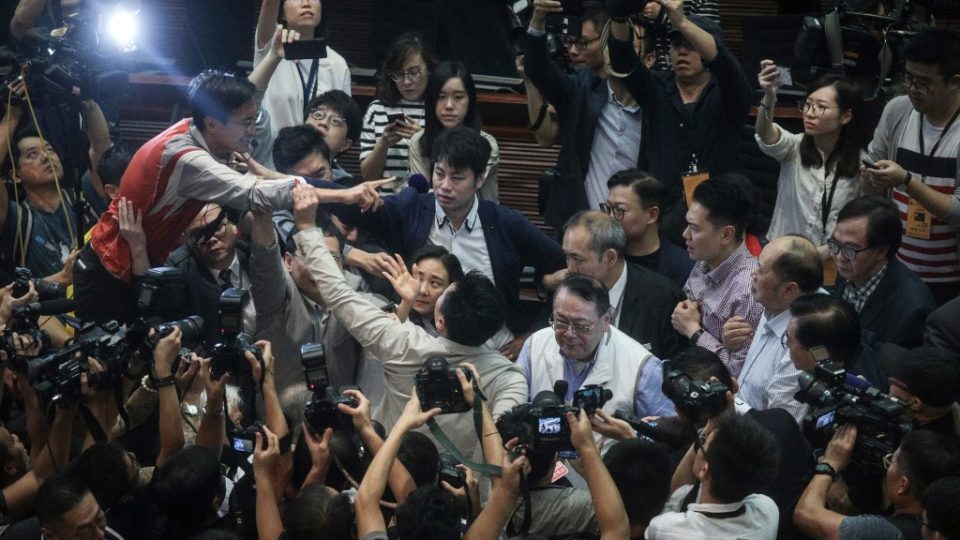Anger over Hong Kong’s controversial plans to allow extraditions to the Chinese mainland boiled over in the city’s legislature on Saturday as rival lawmakers scuffled with each other in chaotic scenes.
The legislative meeting on the government’s disputed extradition bill was originally chaired by pro-democracy lawmaker James To, but the pro-Beijing camp earlier this week forcibly unseated To and replaced him with their choice of chairman, Abraham Shek.
Rancour between the two political camps exploded with rival lawmakers shouting and tussling amidst a dense pack of reporters, as pro-democracy lawmakers tried to seize the microphone and stop their counterparts in the legislature from controlling the meeting.
Pro-democracy lawmaker Gary Fan collapsed and was carried out from the chamber on a stretcher, while others from the pro-Beijing camp claimed they were wounded.
“We couldn’t possibly agree to the suggestion that our meeting chaired by James To should be suspended in any way, because it is completely constitutional and legal,” pro-democracy lawmaker Claudia Mo said after the meeting.
But pro-Beijing lawmaker Shek insisted it is “legal” for him to host the meeting.
Hong Kong’s government is pushing a bill through the city’s legislature which would allow case-by-case extraditions to any jurisdictions it doesn’t have an already agreed treaty with, including mainland China, Macau and Taiwan.
The plan has sparked huge protests and mounting alarm within the city’s business and legal communities — as well as foreign governments — who fear it will hammer the semi-autonomous financial hub’s international appeal and tangle people up in China’s court system.
Historically Hong Kong has baulked at mainland extraditions because of the opacity of China’s criminal justice system and its liberal use of the death penalty.
Tens of thousands of people hit the streets last month to protest against the bill.
But Hong Kong’s pro-Beijing government has argued the bill must be passed quickly to stop 20-year-old resident Chan Tong-kai evading justice for the murder of his girlfriend during a Valentine’s holiday in Taipei last year.
Chan admitted to Hong Kong police that he killed his pregnant girlfriend Poon Hiu-wing, also from Hong Kong, and then flew home. Police were unable to charge him for murder or extradite him to Taiwan because no agreement is in place.
Taiwan authorities said on Friday that it has no intention of asking Hong Kong to return a murder suspect because it is concerned that Hong Kong’s extradition law puts its people at risk of being snatched by China.
Chiu Chui-cheng, deputy minister of Taiwan’s Mainland Affairs Council, said Taiwanese people feared ending up like Lee Ming-che, a democracy activist who disappeared on a trip to the Chinese mainland and was later jailed for “subverting state power”.





